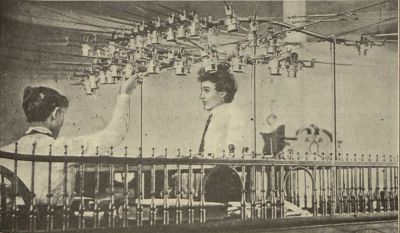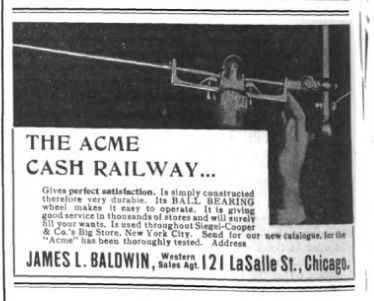

THE CASH RAILWAY WEBSITE |
||||||||
| Home | Manufacturers | Cash Balls | Wire systems | Cable systems | Pneumatic systems | Locations | References | Patents |
Moses C. Sweezy died on 31 December 1911 in his 72nd year. He was president and chief owner of the Acme Cash Railway company with its place of business at 152 Brewery Street, New Haven, Connecticut. He was born in Long Island and established the New Haven Ruffle Company which flourished when women's neck ruffs were popular. He then turned his attention to the invention and perfection of cash carriers. For a long period he was engaged in litigation involving infringements on his invention. "Larger firms annexed his hard worked-out plans." Bridgeport Evening Farmer, 1 Jan. 1912, p.5.
According to the New Haven Morning Journal and Courier, 4 Oct. 1888, p. 2, Mr Swezey "stumbled on the idea" a few weeks ago. "It entirely dispenses with the cumbersome machinery required by railways now in use and therefore both the original cost and the cost of maintenance are much less... Merchants all over New England have already adopted it and are putting it into their stores as fast as possible... On a single track the cash car is sped to its destination and is stopped at the end where wanted by running upon a small coiled wire which is convex in form and about a foot in length. The cash car runs on to this coil and is stopped and held; and a slight push sends it back to the other end of the line where a similar coiled wire stops it there. A slight push will send it to any given spot at a distance of 50, 100, 200 or even 1,000 feet, and a slight pull in the reverse direction will send it back to the starting point."
There was a court case in 1889 with Lamsons alledging infringement of patents.
The Articles of Association were published in the Morning Journal and Courier (New Haven) of 7 Feb. 1889. The business was to be carried out in Connecticut or New York. The capital stock was $5,000, shares were $100 each, and the subscribers were Emma E. Swezey, M.C. Swezey, S.C. Johnson, J.B.Underwood and M.C. Swezey as trustee for Clark L. Swezey.
In July 1889, the Morning Journal and Courier (27 Jul. 1889, p. 2) reported "Marvellous is the demand for the Acme, and it has evidently a great future of prosperity before it." However, it added "Yesterday we learned that the Lamson Company, by its representative, was in town to make negotiations for buying the Acme out and out and consolidating it with their patent cash railway system. They see the tide of success which the Acme is meeting, and fearing it as a very formidable rival desire to take it out of the field of competition against them." Several locations in New Haven were listed.
A large order in 1889 was 100 stations for Bloomingdales in New York. Morning Journal (New Haven), 12 Feb. 1889, p. 2
Mr D.F. Champion, an electrician based at 23 Court Street, Houlton, ME, is listed as the sole agent for Maine for the Acme Cash Railway System in Northern Maine: its points of interest and its representative business men by George F. Bacon (Newark: Glenwood, 1891), p. 21
In 1891 the Acme Cash Railway corporation leased to the National Autographic Register Co. of 250 Canal Street, New York, the right to manufacture, rent and sell Acme systems. "Ample facilities for manufacturing and the co-operation of the several local autographic register companies companies will bring the systems within the reach of all parts of the United States, Canada and other lands." Morning Journal (New Haven), 24 Apr. 1891, p. 2
There was an advertisement in Home Furnishing Review, vol. 13, ?1898, p. 81: "Single Wheel Acme Cash Railway. Only $14 per station and satisfaction guaranteed. Send for illustrated catalogue covering our full line. Inventors' models made to order. L.A.Holmes, manager." Loomis' Musical and Masonic Journal (based in New Haven) had regular advertisements around 1897-8 by the New Haven Display Fixture Co., 67 and 69 Court Street, New Haven including "The Acme Cash Railway Co., systems sold outright, same address."
A programme of the Grand Opera House, London, Ont. for the play A female drummer on 11 October 1898 states "Acme Cash Railway Co. of New Haven furnished the Second Act with the complete system of their service. M.C. Swesey, patentee."
"The Advance records the success of the Acme Cash Railway System, made possible by patents issued to M. C. Swezey, formerly of East Patehogue. It has installed its system in some 6,000 stores , including the large department ones. Mr. Swezey, though past 60 years of age, is hale and vigorous, and travels about 1,000 miles weekly between the New Haven factory and the New York city office." Suffolk County News, 4 May 1900
"Our former townsman, M.C. Swezey .. for many years one of the most active workers in the Church of the Redeemer, now a resident of our neighbouring town, Orange... The main office of Mr. Swezey's company is 74 Fifth Avenue, New York city.. Mr. Sewzey being at the New York office from 10 a.m. to 2 p.m. and at the New Haven office from 4 p.m. to 6 p.m." New Haven Morning Journal, 6 Aug. 1900, p. 3
In 1900 a court decision stated that "the Osgood patent is limited to a two-wheeled car, running with both its wheels on the top of a practically horizontal wire... The Acme cash railway used a one-wheeled car, running on a wire that is practically inclined for a useful purpose." New Haven Morning Journal, 2 May 1901, p. 10
"Mr. James E. Baldwin of Chicago .. is the western agent of the Acme Cash Railway company." Ibid. 9 Jul. 1901, p. 6
 |
 |
The left illustration is of the No. 32 Hand Push Carriers manufactured by the Acme Cash Railway Co. The carriers are operated by a slight push of the hand on the ends of the cars. Being balanced on ball-bearing wheels, little effort is required to send them to their destination. No springs, pulleys or rubbers are involved. Hardware Dealers' Magazine, 1 July 1919, p. 87.
I have no information on any other models although the "No. 32" would suggest an extensive range.
"The Acme Cash Railway is built by the E.A.Burgess estate, 67-69 Court Street, New Haven, Conn., and is so effective and withal so cheap that it is a serious question if any live shopkeeper can afford to be without it."
The right illustration is from the Chicago Dry Goods Reporter of 3 March, 1900, p. 60. By this time Baldwins either owned Acme or were at least acting as their agents.
There is also the Australian "Acme cash carrier" - see Other manufacturers. This does not appear to be connected with the American company.